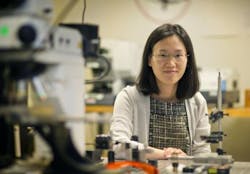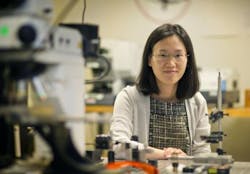Optofluidic laser in development for better disease detection wins $500,000 NSF grant
An optofluidic laser in development at the University of Texas at Arlington (UTA) promises better disease detection—including cancer—in a clinician's office, and has been awarded a National Science Foundation (NSF; Arlington, VA) five-year, $500,000 Faculty Early Career Development or CAREER Program grant. Award recipient Yuze "Alice" Sun, a UTA assistant professor of electrical engineering, is developing the laser, which also could have utility as a versatile biosensing platform with exceptional detection sensitivity, selectivity, and throughput.
Related: Optofluidics and the next generation of health-care engineering
Most lasers are semiconductor-based and require solid material to create cavities to confine light. In optofluidic lasers, two-phase liquids are controlled using microfluidics and nanofluidics to form a highly efficient optical microcavity. The all-liquid nature makes the laser adaptive and achieves high-precision tuning in an unprecedented manner. "Optofluidic lasers are unique because the microlaser can be achieved through 'smart' self-assembly at the liquid-liquid interface," Sun says. "Because of this unique structure, the optofluidic laser is biocompatible and bioconfigurable. It could eventually be applied to in vivo biosensing, although this is beyond the scope of the current project."
Sun says that she initially will explore using the optofluidic laser to detect biomarkers for cancer diagnosis and possibly other genetic disorders at the molecular and cellular level. Her development could someday lead to the creation of a point-of-care platform for clinicians to use in an office rather than having to send samples away for analysis, she explains.
Including her CAREER Award, Sun has been the primary investigator on research grants totaling more than $900,000 since beginning her career in 2013. She has been involved with several other projects totaling nearly $1 million as a co-principal investigator in that time. Her research interests include optofluidic biomedical and chemical sensing; nanophotonics and biophotonics; microfluidics and point-of-care devices; and bio-inspired photonic devices and systems.
The Faculty Early Career Development Program is the NSF's most prestigious award for junior faculty. Winners are outstanding researchers, but also are expected to be outstanding teachers through outstanding research, excellent education, and the integration of education and research at their home institutions. The goal of the program is to identify faculty who have potential to become leaders in their fields and give them a significant grant to begin to realize that potential.
For more information, please visit www.nsf.gov.

